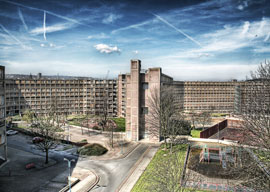
November 24, 2013

Park Hill Estate, Sheffield, England
Every night and every morn
Some to misery are born,
Every morn and every night
Some are born to sweet delight.
The first couplet of Blake’s verse seems to me a good deal more certain than the second because happiness and misery, while opposite, are not in the least symmetrical. I count myself to have had more than a usually fortunate life (except for a wretched childhood), and I think I have been in the top one percent of humanity where luck is concerned, but still I would not say that I had been born to sweet delight, even if I cannot take the credit for my good fortune.
The problem is that sweet delight, as the Buddha knew, contains within itself the seeds of its own decay, unlike misery which has within it no inherent tendency to change into its opposite and can last a lifetime. It is impossible to remain ecstatic for very long. Anyone who says that he can and does is either lying or mad. Happiness is like the blush of a grape, and consciousness of it is like the finger that destroys that blush. But there are many people whose misery is continuous and unremitting and seems from birth to have been predestined.
I have spent quite a lot of my professional life as a doctor among such people, and recently I was asked by the courts to examine a woman charged with murder whose deed was terrible and reprehensible but whose life, it seemed to me (and I am generally no determinist), had led, if not quite inexorably to murder, at least to constant disaster.
Her father and uncle sexually abused her from the age of eight, and when she told her mother, a cocaine addict, her mother beat her for being a “dirty” girl. Her father and uncle were alcoholics. Her father invited men into the house to have sex with her mother in return for money. He was violent if she refused and sometimes if she accepted.
Her mother soon left her father and had a succession of lovers to live in with her. All of them were drug addicts or alcoholics, and practically all were violent. She (the woman whom the courts asked me to examine) began to take drugs and drink, at her mother’s instigation and with her encouragement, at the age of twelve or thirteen. By the age of fifteen she was pregnant by one of her mother’s lovers, who more or less forced himself upon her with her mother’s consent. Her mother meanwhile had several children by different men. Suffice it to say that life did not improve for her thereafter.
She was not intelligent and her school did nothing to prepare her for life in a modern economy, let alone provide her with anything recognizably like a liberal education. She could read, just about, but could not add six and seven and could not multiply five by four (though she knew, she told me proudly, her two times table). This, after a state education costing $100,000! A miracle of incompetence and dereliction of duty! Her few jobs did not last long, were unskilled, and paid very little, giving her an income no larger than that provided by the state, the latter increasing with each of her successive children (by different men, of course). In all, she had worked but a few months in her life, the rest given over to childbearing. Everyone around her lived the kind of life she had led, or to which she had been led.
I think even the sternest of moralists”such as I”could not help but think on hearing her story of Blake’s line, “some to misery are born.” Prison was the first time in her life she had experienced reasonably consistent and decent treatment; and sad to relate, her loss of freedom was a boon to her. She flourished (comparatively speaking) there.